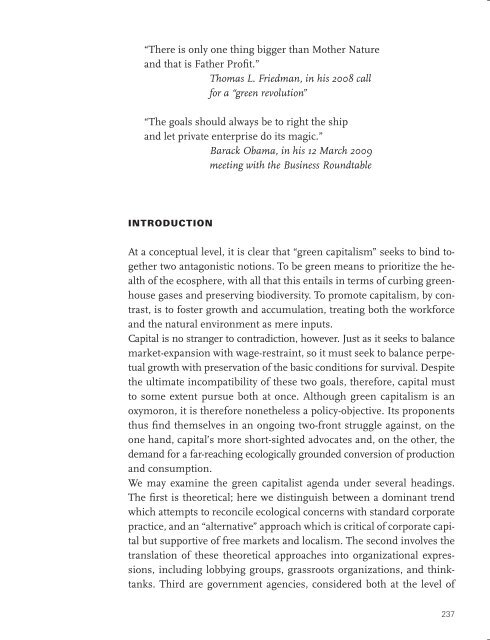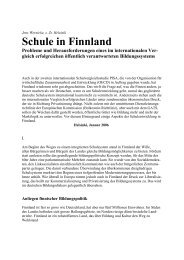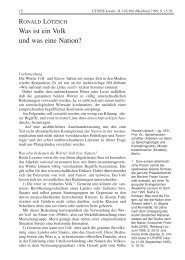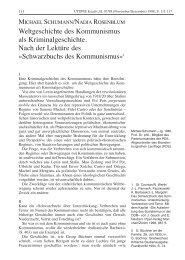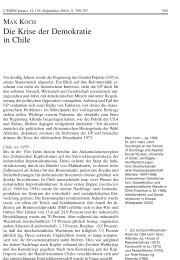- Seite 1 und 2:
DIETZ BERLIN | ROSA LUXEMBURG STIFT
- Seite 3 und 4:
STEPHAN KAUFMANN UND TADZIO MÜLLER
- Seite 5 und 6:
VORWORT von Mario Candeias und Sabi
- Seite 8 und 9:
VORWORT 8
- Seite 10 und 11:
halb des Machtblocks, die eine Neuk
- Seite 12 und 13:
EIN NACHRUF 1. UND EINE EINLEITUNG
- Seite 14 und 15:
den. 3 Bewegungen brauchen Gegner:
- Seite 16 und 17:
KRISE(N) 16 2.
- Seite 18 und 19:
elle Krise von im starken Sinne »s
- Seite 20 und 21:
sitive Effekte auf die Produktivit
- Seite 22 und 23:
KonsumentInnen fehlt der Weltwirtsc
- Seite 24 und 25:
enz um die Aneignung fossiler Energ
- Seite 26 und 27:
schon heute die Lebensgrundlage von
- Seite 28 und 29:
saufende Eisbären. Durch den Klima
- Seite 30 und 31:
men zwischen Kapital und Arbeit (st
- Seite 32 und 33:
NACHHALTIGKEIT - DIE NEUE HARMONIE
- Seite 34 und 35:
Natur nicht per se im betriebswirts
- Seite 36 und 37:
mensetzt: Umweltschutz (Kap. 2.1),
- Seite 38 und 39:
loren gehen. Erwärmt sich die Erdo
- Seite 40 und 41:
Die ungebremsten CO2-Emissionen gef
- Seite 42 und 43:
tur hier bemerkenswert und folgenre
- Seite 44 und 45:
»werden die Kosten erheblich anste
- Seite 46 und 47:
Einen Beitrag soll der Klimaschutz
- Seite 48 und 49:
In der Unternehmensbilanz erscheint
- Seite 50 und 51:
dem BDI-Rohstoffkongress 2007. »Wo
- Seite 52 und 53:
uchen ihre Ölausgaben als puren Ab
- Seite 54 und 55:
ten ›freien‹ Vorkommen an fossi
- Seite 56 und 57:
Importabhängigkeit Deutschlands im
- Seite 58 und 59:
instabil eingeschätzt werden« (Ho
- Seite 60 und 61:
Kohle ist nicht nur sicher verfügb
- Seite 62 und 63:
vom Kampf um Öl und Gas. »Da der
- Seite 64 und 65:
Noch ist Energie aus regenerativen
- Seite 66 und 67:
treffenden Ländern sichern 62 - we
- Seite 68 und 69:
Priorität. Die Senkung der CO2-Emi
- Seite 70 und 71:
Billion Euro stammen aus der Bundes
- Seite 72 und 73:
Weltmarktvolumen in Mrd. Euro 2007
- Seite 74 und 75:
Erneuerbare Energien I: Wind Wind i
- Seite 76 und 77:
GE kommt aber aus Deutschland, und
- Seite 78 und 79:
sechs weitere sind bereits bestellt
- Seite 80 und 81:
härter. Unter den sieben marktbehe
- Seite 82 und 83:
kus auf dem Export: Im ersten Quart
- Seite 84 und 85:
Der Welthandel mit Industriegütern
- Seite 86 und 87:
Kohletechnologie nicht zu nutzen.«
- Seite 88 und 89:
Diese Vorteile kommen auch den Hers
- Seite 90 und 91:
Welthandelsanteil nachhaltige Mobil
- Seite 92 und 93:
und Nutzfahrzeuge. Der Münchner Au
- Seite 94 und 95:
Energie- und Ressourceneffizienz st
- Seite 96 und 97:
In den kommenden Jahren werden die
- Seite 98 und 99:
Produkte umlegen können, ist dies
- Seite 100 und 101:
Die hohen Kosten für Erneuerbare k
- Seite 102 und 103:
Es wird deutlich, wie die propagier
- Seite 104 und 105:
— Auch einem noch stärkeren Ausb
- Seite 106 und 107:
gewesen, bei 30 % habe es sich um v
- Seite 108 und 109:
Damit ist der Klimawandel kein »Me
- Seite 110 und 111:
sprüchen, die als Gerechtigkeitser
- Seite 112 und 113:
An diesen Gegensätzen wäre das Ky
- Seite 114 und 115:
Unternehmen. Und Jahr für Jahr wir
- Seite 116 und 117:
mit kostengünstig oder mit dirigis
- Seite 118 und 119:
digt und damit die eigenen Unterneh
- Seite 120 und 121:
Das Kriterium der Zusätzlichkeit v
- Seite 122 und 123:
arde Euro ... Eine Einschränkung d
- Seite 124 und 125:
te wie für Gaskraftwerke. Damit wi
- Seite 126 und 127:
Emissionshandel unverändert verabs
- Seite 128 und 129:
Versuchsprojekte zu unterstützen.
- Seite 130 und 131:
sie bauen besonders schwere, starke
- Seite 132 und 133:
höchsten Gewinnspannen erzielen. D
- Seite 134 und 135:
Zudem lässt der Kompromiss den Her
- Seite 136 und 137:
plausiblen Konstellationen steigt d
- Seite 138 und 139:
den, bis 2050 könnte der CO2-Ausst
- Seite 140 und 141:
erwärmung und andere Klimaänderun
- Seite 142 und 143:
Fazit: »Der Emissionshandel als Kl
- Seite 144 und 145:
massiv vermindert werden. Inzwische
- Seite 146 und 147:
Überlandleitungen, gegen Atomkraft
- Seite 148 und 149:
das ist ebenso Materie wie Ergebnis
- Seite 150 und 151:
der an dieser Stelle aufheben - was
- Seite 152 und 153:
Wenn deutsche Politiker also auf in
- Seite 154 und 155:
gelt, wer wie viel CO2 zu welchem Z
- Seite 156 und 157:
DER GRÜNE KAPITALISMUS: 4. PLUS Ç
- Seite 158 und 159:
systemischen Eigenschaften des Kapi
- Seite 160 und 161:
on« (Allianz 2007) mit sich bringe
- Seite 162 und 163:
nomics foundation - brachte die Ide
- Seite 164 und 165:
fordistische Arrangement zu sprenge
- Seite 166 und 167:
2007, 22). Ein zweites Mal wurden g
- Seite 168 und 169:
Das Projekt eines GND suggeriert, d
- Seite 170 und 171:
staat für Unternehmen beschreiben
- Seite 172 und 173:
getriebenen Höhepunktes bis auf ca
- Seite 174 und 175:
dazu beitragen, dass die Dynamik de
- Seite 176 und 177:
Jede Situation, in der Löhne dauer
- Seite 178 und 179:
Dieses Zitat stammt aus einem Beric
- Seite 180 und 181:
ger in der Lage sein werden, in den
- Seite 182 und 183:
Mit anderen Worten: Unter den gegeb
- Seite 184 und 185:
SOZIALÖKOLOGISCHE TRANSFORMATION S
- Seite 186 und 187: mus wurde (Brüggen 2001). Sie argu
- Seite 188 und 189: stein ist die Definition von Wahnsi
- Seite 190 und 191: Angesichts der Frustration ob der D
- Seite 192 und 193: Aus der produktiven, wenngleich nic
- Seite 194 und 195: Klimagerechtigkeit Oben schon einge
- Seite 196 und 197: Und welche Idee müssen wir uns dan
- Seite 198 und 199: Im Konzept der ›solidarischen Tra
- Seite 200 und 201: gen niedrig ist) oder Indien (desse
- Seite 202 und 203: zentriert sein sollten, und dass da
- Seite 204 und 205: LITERATUR- L VERZEICHNIS 204
- Seite 206 und 207: ders., Achim Brunnengräber, Lutz S
- Seite 208 und 209: Friends of the Earth US, 2009: Subp
- Seite 210 und 211: Müller, Tadzio, 2008: The movement
- Seite 212 und 213: Wissen, Markus, 2006: Territorium u
- Seite 214 und 215: DIETER KLEIN GRÜNER KAPITALISMUS -
- Seite 216 und 217: Die Klüfte zwischen Oben und Unten
- Seite 218 und 219: danken einer alternativen Klimapoli
- Seite 220 und 221: Wenn dem gleichwohl eine Nachbemerk
- Seite 222 und 223: Ist es sinnvoll anzunehmen, dass ei
- Seite 224 und 225: Energien in den nächsten drei Jahr
- Seite 226 und 227: gen das Ziel, die Strukturen der he
- Seite 228 und 229: man an einer entscheidenden Stelle
- Seite 230 und 231: te und ihr Wachstum dem sich wandel
- Seite 232 und 233: hatten (de Swaan 1992), könnte die
- Seite 234 und 235: Altvater, Elmar, 2009: Grün im XXL
- Seite 238 und 239: oad policymaking and in their regul
- Seite 240 und 241: quently, the green capitalist posit
- Seite 242 und 243: esult of social/political pressure)
- Seite 244 und 245: wer to be diffused on a scale suffi
- Seite 246 und 247: porate management, namely by arguin
- Seite 248 und 249: Simply put, true free-market capita
- Seite 250 und 251: leading activist, and his role in s
- Seite 252 und 253: Defense Fund, likewise overseen by
- Seite 254 und 255: sulting credit to another company -
- Seite 256 und 257: As for what such a policy might ach
- Seite 258 und 259: Bank. While Obama may have inspired
- Seite 260 und 261: not be listed as criteria air pollu
- Seite 262 und 263: writers who shy away from critiques
- Seite 264 und 265: private to the public sphere, where
- Seite 266 und 267: Both in the US and in Europe, it se
- Seite 268 und 269: ders., Brett Clark, & Richard York,
- Seite 270 und 271: 270
- Seite 272: 272


